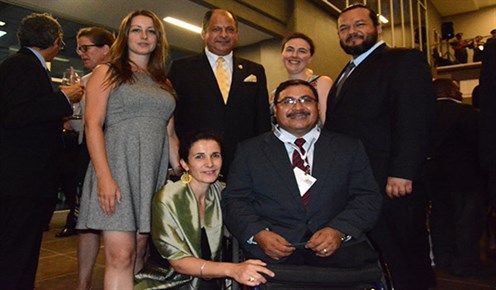02 September 2014
100 Countries Gather in Costa Rica to Support Cluster bomb Treaty Amidst Evidence of New Use in Syria
 CMC campaigners with the President of Costa Rica, Luis Guillermo Solís, at the Opening Ceremony of the Fifth Meeting of States Parties to the Convention on Cluster Munitions. (Photo L-R Amy Little, Sylvie Brigot, President of Costa Rica, Luis Guillermo Solís, Jesús Martínez, Amelie Chayer, Héctor Guerra) ©CMC
CMC campaigners with the President of Costa Rica, Luis Guillermo Solís, at the Opening Ceremony of the Fifth Meeting of States Parties to the Convention on Cluster Munitions. (Photo L-R Amy Little, Sylvie Brigot, President of Costa Rica, Luis Guillermo Solís, Jesús Martínez, Amelie Chayer, Héctor Guerra) ©CMC
(Download Press Release in English and Spanish)
Some 100 countries are participating this week in the Fifth Meeting of States Parties to the 2008 Convention on Cluster Munitions in San José, Costa Rica, to discuss progress made in eradicating this internationally banned weapon, as new evidence emerges of cluster bomb use by Islamic State forces in Syria.
According to a Cluster Munition Coalition member Human Rights Watch report on Monday, Islamic State forces used ground-fired cluster munitions in at least one location in northern Syria in recent weeks. This is the first report of a non-state armed group using cluster munitions since the treaty entered into force in 2010.
“The appalling number of civilians killed by cluster munitions since 2012 and new use in South Sudan and Ukraine are a red flag to countries to get on board the Convention immediately to prevent further humanitarian tragedies,” said Sarah Blakemore, Director of the Cluster Munition Coalition. “States present at the meeting should not only speak out loudly to condemn this use but must also help to ensure that all countries join the ban on cluster munitions and destroy their stockpiles immediately,” she added.
States are confronted with the latest report of use even as the treaty marks significant progress in eliminating the suffering caused by cluster munitions.
A total of 113 countries have already signed or acceded to the 2008 Convention on Cluster Munitions, which prohibits the use, production, transfer, and stockpiling of cluster munitions, and requires the clearance of cluster munition remnants within 10 years as well mandating assistance for victims. Of these countries, 84 are States Parties while the other 29 have signed but not yet ratified the Convention.
To date, 22 countries have destroyed 1.16 million cluster munitions and almost 140 million submunitions, representing more than three-quarters of the weapons declared stockpiled under the ban convention, according to the Cluster Munition Monitor 2014 report, released on 27 August. The Monitor, the research arm of the Cluster Munition Coalition, documented destruction of more than 54,000 cluster munition remnants in 2013.
Representatives of governments, UN organizations, the International Committee of the Red Cross, and the Cluster Munition Coalition including cluster munition victims (survivors and family of victims) from Tajikistan, the United States and Vietnam, are participating in the meeting.
“This treaty is making a huge impact in eliminating the suffering caused by these indefensible weapons,” said CMC member Lynn Bradach, whose US Marine son was killed by a cluster submunition while clearing unexploded ordnance in Iraq. “These new use allegations show that the only way to protect citizens from the horror of cluster bombs, is for countries to get on board with no more excuses!” Bradach said.
This is the first time the meeting has been in Latin America, previous meetings of the Convention were held in Lao PDR, Lebanon, and Norway and Zambia, who will hand over the presidency of the Convention on Cluster Munitions, to Costa Rica at the meeting this week.
In an official opening ceremony last night, Costa Rican President Luis Guillermo Solís emphasized the country’s commitment to elimination of cluster munitions globally. In his remarks, President Solis welcomed new political commitment by Belize to join the Convention. With Belize’s adherence to the treaty, Central America would be the world’s first cluster munition free region.
The President emphasized Costa Rica’s role in expanding treaty membership and stigmatizing the weapon in the run up to the First Review Conference of the Convention which takes place one year from now and will be a definitive moment for the treaty. “We need to pass from condemnation to action,” President Solís said.


